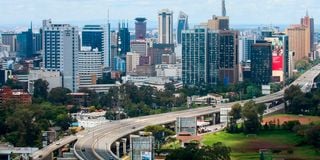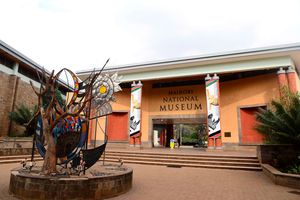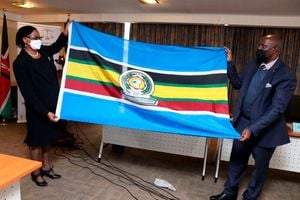
A view of the Nairobi city skyline.
A fortnight ago, it was reported that the United Nations Population Fund (UNFPA) will relocate up to 25 per cent of its New York staff to Nairobi by 2025.
The decision is being contested by staff, and there are reports of “tanking morale” as a result of it.
That, like Oxfam’s that started a snail-pace move of its International Secretariat from its headquarters in Oxford, UK, to Nairobi, in 2018, seeks to bring the “agency closer to the communities it serves”, an expression with a familiar African ring to it.
UNFPA employs just over 2,000 full-time employees in 150 countries, so the number from New York who would move to Nairobi is unlikely to fill a big beer hall.
But the impact of the logistics and sub-contracting to support their work, and other indirect benefits, could be significant.
Nairobi doesn’t have New York’s fine restaurants, art galleries and such other goodies, so what might one sell to the UNFPA-move-to-Nairobi Resistance? Perhaps intellectual curiosity about the country.
People talk of “resilience”, but often they are not specific. Kenya might offer them an example. When in 2014 Kenya rebased its gross domestic product (GDP) to become Africa’s 9th largest economy, there was an untold story about that.
For the period when the economic data was reviewed, Kenya went through the aftermath of its worst post-independence crises — the 2007/2008 post-election violence.
According to Carlos Lopes, then-Executive Secretary of the UN’s Economic Commission for Africa, besides wide-ranging social penalties, the few weeks of PEV cost the Kenya economy over $3.6 billion!
Brand ambassador for Kenya
Yet, within the following five years Kenya managed some of the most ambitious infrastructure investments on the continent: Thika Superhighway, started on the expansion of Jomo Kenyatta International Airport, launched the Lamu Port-South Sudan-Ethiopia-Transport corridor (LAPSSET) the construction of Birth 19 at Mombasa Port, and in the 2012/13 financial year, good old President Mwai Kibaki achieved that rarest of feats in Kenya—a budget surplus.
In that period, Safaricom’s world-renowned M-Pesa mobile phone-based money transfer service took off, and the flourish in the technology scene that followed the PEV earned the country the moniker “Silicon Savannah”.
It has not quite achieved the same excellence since.
That period was also the glorious era of Kenya Airways (KQ). I remember in 2012 hopping around in West Africa to several cities, all of them on KQ, and thinking “Kenya Airways will truly rule African skies, and its slogan ‘The Pride of Africa’ isn’t poppycock”.
Then life happened.
They will be interested to learn that Kenya, of the countries in the region, has the most entrenched tradition of an apolitical military (although in the past 10 years, there has been creeping militarisation of some government functions to a military considered more efficient and not riddled with corruption like the private/civilian sector).
Like Tanzania, it escaped military coups, but in Tanzania, in the old times, the military was represented in Parliament.
Why this is so, is a subject that has not been well studied or written on with persuasive authority.
Then there is Tusker (one of the most famous African beers internationally). It is also an important brand ambassador for Kenya, and its elephant logo draws strong association with wild safaris, as opposed to the booze itself (unlike, for example, Vodka, which these days is an exemplar of fine gin, not Russia).
There are discoveries to be made about how this came to be.
Africa’s tech capitals
Kenyan companies like Safaricom, KCB, Equity Bank, Serena Hotels, and others have had the most success compared to their regional peers in expanding in the wider Eastern African region. This is even though they are not particularly hippy companies with chill rooms where diffusers dispense eucalyptus scent.
And although it has gotten a bit wobbly in recent years, Nairobi — along with Lagos in Nigeria; Cape Town, South Africa; and Cairo, Egypt — remains one of Africa’s tech capitals.
It all began somewhere. When and how, is another mystery to solve. And why did it happen in Kenya in East Africa at that point, and not anywhere else?
Kenya has had a long reign as a global long-distance running power and, along with Ethiopia, continues to dominate the industry. A lot has been written and researched about the source of this skill but we don’t know much about how it has managed to stay up there.
In sports, such winning streaks rarely span decades. Also, the question of what country Kenya would have been if it didn’t have good long-distance running genes waits to be answered.
Kenya has also managed something that has proven hard to do in the East Africa Community: Devolved political system. It was also the first in Africa where, in 2017, a court overturned a presidential election.
Where does all this come from, and what does it tell us about its political soul?
Kenya and Nigeria have won the overwhelming Caine Prizes for African Literature. What do these two countries have in common?
You have to be curious, no?
Mr Onyango-Obbo is a journalist, writer and curator of the "Wall of Great Africans". @cobbo3







